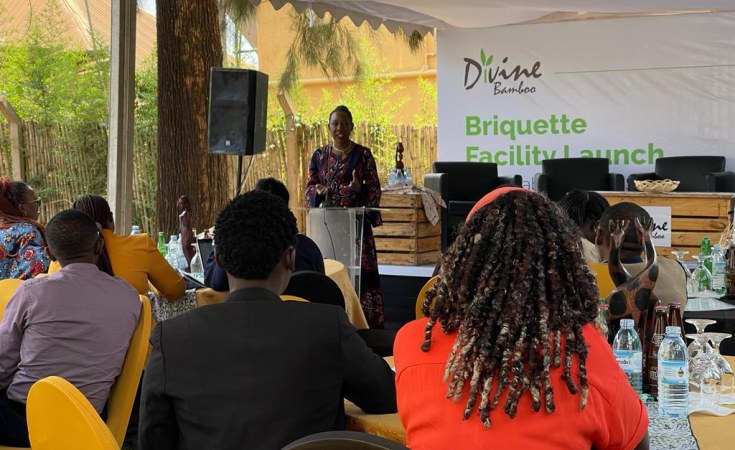As the country continues to look for ways to fight climate change, Divine Bamboo Briquette, a facility that uses bamboo to make briquettes as one of the ways to promote clean cooking has been launched in Kampala.
Speaking during the launch of Thursday, Divine Nabaweesi, the proprietor of Divine Bamboo, the idea started with a study done with Ndejje University and tested it with Centre for Research in Energy and Energy Conservation.
"We needed to know how this alternative of briquettes from bamboo compares with charcoal. We therefore needed scientific evidence but to say it is better. We needed to know how it is better. We needed to know how long do these briquettes burn, their moisture content and their ash content among others. The research was successful," Nabaweesi said.
She noted that they later partnered with the United Nations Development Program(UNDP) who funded the pilot project to see how to go commercial but on small scale, a stage they are on now.
"Our capacity right now is 10 metric tons per month and we wanted to see which machinery we needed, how the market would respond. Last year we carried out a study funded by the World-Wide Fund for Nature (WWF). We conducted a study and realized the market is segmented in individuals, households and institutions and need to devise strategies to reach out to these segments."
She noted that for the past few years they have been testing the market but noted they have secured a big space in Bombo , along the Gulu highway from where they will expand the briquette factory and bamboo nursery to produce the briquettes on a large scale.
Alternative source of energy
James Kyewalabye, the programs manager at Divine Bamboo underscored the use of bamboo as an alternative source of energy.
"Bamboo is an indigenous plant in Uganda found in many areas and also eco-friendly. Because of its tap root system, it can be able to control erosion and flooding of rivers. It has potential to create various economic opportunities for communities,"Kyewalabye.
He explained that it makes more sense for bamboo to be grown as an alternative source of energy, other than other types of trees.
"Even if you plant a bamboo for firewood or get briquettes out of it, you will still have a bamboo plant standing and stop deforestation. With over 90% of people in Uganda dependent on firewood and charcoal, bamboo can ably play this role as source of biomass."
With efforts to fight climate change allover the world, Kyewalabye said the use of bamboo as an alternative source of energy makes sense since it controls deforestation but also using bamboo briquettes are cheaper than any other source of energy.
"The bamboo briquettes cost 30% less than charcoal but also burn twice as long as charcoal and emit less fumes and smoke. Using bamboo briquettes is sustainable because bamboo is generative and our supply chain includes smallholder farmers who can then earn revenue from planting bamboo but have opportunities to produce several other products to diversify their incomes."
To ensure sustainability, the programs manager at Divine Bamboo said they have the biggest bamboo nursery in the country which can produce 200,000 seedlings of bamboo annually.
"Whereas we currently produce 10 metric tons of briquettes per month, we are looking at scaling this up to produce 24000 metric tons per month in the next five years as we promote the use of bamboo briquettes as an alternative form of clean energy," Kyewalabye said.
Gloria Namande , the Program Manager in charge of energy and climate change at UNDP in Uganda hailed the initiative that she said resonate with the national and international efforts to deal with climate change.
"Deforestation is on the increase and as efforts to fight climate change increase, this is a good initiative. This is contributing to reduction in deforestation and reduction of greenhouse emissions and contributing to the national and global targets of reducing global warming," Namande said.
She promised UNDP will continue working with Divine Bamboo to spread the gospel of clean energy.


